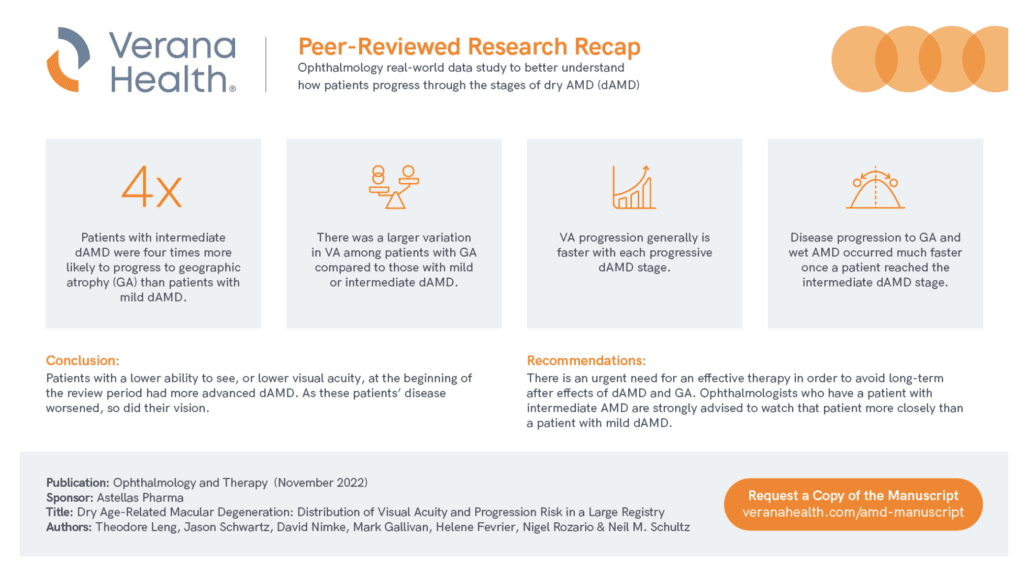Verana Health Study of Patients with Dry Age-Related Macular Degeneration Leverages Curated IRIS Registry Data for Insights into Disease’s Progression
Author:
Theodore Leng, MD, MS, Verana Health
Macular degeneration is a progressive condition that occurs when a person’s retina becomes damaged over time, leading to different levels of vision loss in the elderly population. There are two types of AMD: dry and wet. Dry AMD (dAMD) is far more prevalent, occurring in 85% to 90% of all AMD patients.
The most advanced form of dAMD is called geographic atrophy (GA), a condition in which large regions of the macula cease to function. No approved treatments currently exist for GA, which impacts roughly 1.5 million Americans and can cause irreversible vision loss and even blindness.
Recently, I had the privilege of leading a research team that conducted a novel study to capture the prevalence estimates of visual acuity (VA) categories and risk of progression in dAMD by stage. The study, “Dry Age-Related Macular Degeneration: Distribution of Visual Acuity and Progression Risk in a Large Registry,” was recently published in the peer-reviewed journal Ophthalmology and Therapy. It highlights the importance of identifying patients with dAMD before the condition progresses beyond the mild stage to avoid long-term damage to vision.
Our study used de-identified, curated, real-world data (RWD) from the American Academy of Ophthalmology (Academy) IRIS® Registry (Intelligent Research in Sight)—which is managed by Verana Health’s VeraQ™ data engine—to better understand how patients progress through the stages of dAMD. The IRIS Registry is one of the largest specialty society clinical data registries in all of medicine, containing ophthalmic records for more than 75 million patients stretching approximately 10 years. Verana Health is the Academy’s end-to-end data and technology partner for the IRIS Registry.
The clinical conclusion from our study is that if ophthalmologists have a patient with intermediate AMD, they are strongly advised to watch that patient more closely than a patient with mild dAMD
Study Results
After reviewing de-identified patient records, the Verana Health team identified a cohort of approximately 645,000 patients with confirmed dAMD. Tracking these patients over a four-year period (2016-2019), we determined that patients with a lower VA at the beginning of the review period had more advanced dAMD. Verana Health researchers also determined that as these patients’ disease worsened, so did their vision.
More specifically, our study concluded that:
- Patients with intermediate dAMD were four times more likely to progress to GA than patients with mild dAMD.
- There was a larger variation in VA among patients with GA compared to those with mild or intermediate dAMD.
- VA progression generally is faster with each progressive dAMD stage.
- Disease progression to GA and wet AMD occurred much faster once a patient reached the intermediate dAMD stage.

The clinical conclusion from our study is that if ophthalmologists have a patient with intermediate AMD, they are strongly advised to watch that patient more closely than a patient with mild dAMD. Our findings highlight the need for new medication options to reverse or delay the worsening of dAMD and improve the quality of life for patients. We are hopeful that the results will guide novel therapies for dAMD that are on the cusp of being approved.
Our findings highlight the need for new medication options to reverse or delay the worsening of dAMD and improve the quality of life for patients.
I want to thank my study colleagues, Helene Fevrier, manager of Quantitative Sciences at Verana Health, and Mark Gallivan, associate director of RWE analytics at Trinity Life Sciences (and former senior quantitative scientist at Verana Health).
Ophthalmology and Therapy is an international, open access, peer-reviewed (single-blind), and rapid publication journal. The scope of the journal is broad, covering the use of ophthalmological therapies, devices, and surgical techniques.
To request a copy of this manuscript from Verana Health, visit: veranahealth.com/amd-manuscript.

Let's Accelerate Research Together
To learn more about Verana Health, please fill out the information below and our team will follow up with you as soon as possible.

